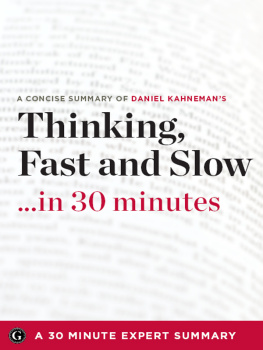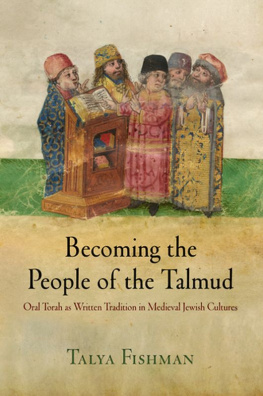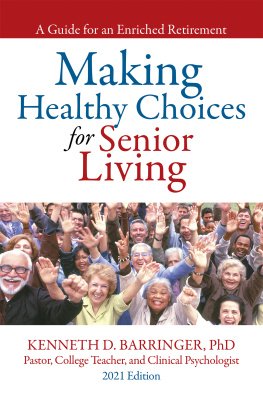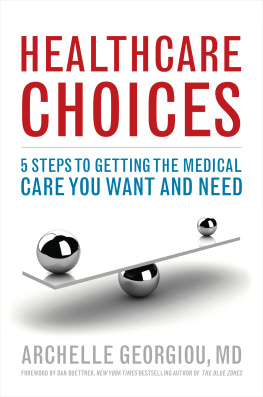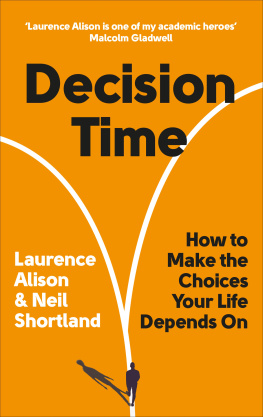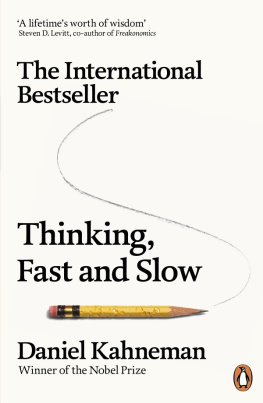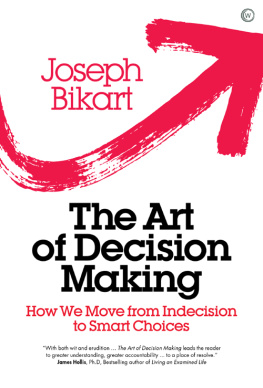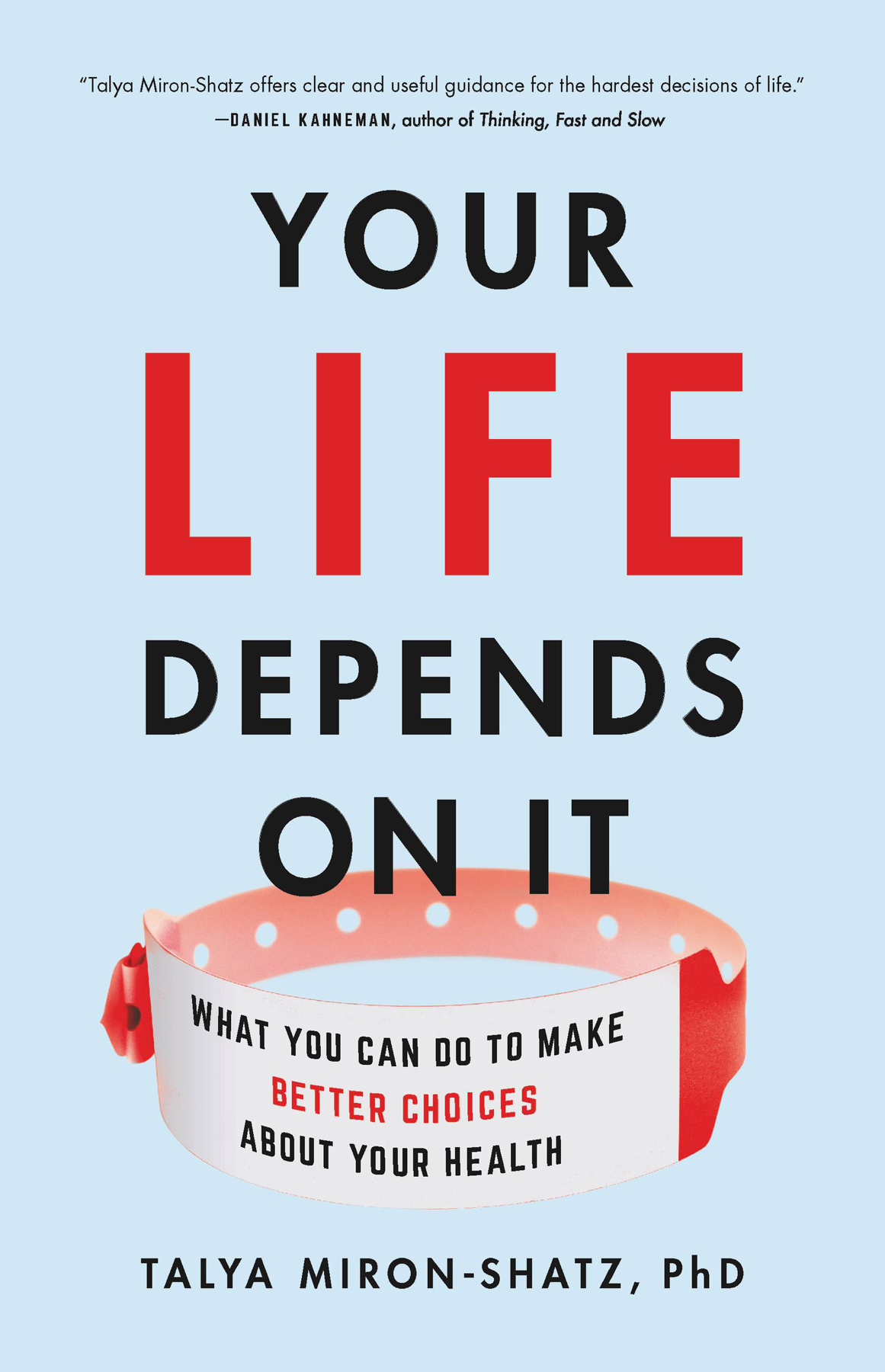
Copyright 2021 by Talya Miron-Shatz
Cover design by Chin-Yee Lai
Cover image copyright Imagepixel/Shutterstock.com
Cover copyright 2021 by Hachette Book Group, Inc.
Hachette Book Group supports the right to free expression and the value of copyright. The purpose of copyright is to encourage writers and artists to produce the creative works that enrich our culture.
The scanning, uploading, and distribution of this book without permission is a theft of the authors intellectual property. If you would like permission to use material from the book (other than for review purposes), please contact permissions@hbgusa.com. Thank you for your support of the authors rights.
Basic Books
Hachette Book Group
1290 Avenue of the Americas, New York, NY 10104
www.basicbooks.com
First Edition: September 2021
Published by Basic Books, an imprint of Perseus Books, LLC, a subsidiary of Hachette Book Group, Inc. The Basic Books name and logo is a trademark of the Hachette Book Group.
The Hachette Speakers Bureau provides a wide range of authors for speaking events. To find out more, go to www.hachettespeakersbureau.com or call (866) 376-6591.
The publisher is not responsible for websites (or their content) that are not owned by the publisher.
Library of Congress Cataloging-in-Publication Data
Names: Miron-Shatz, Talya, author.
Title: Your life depends on it : what you can do to make better choices about your health / Talya Miron-Shatz, PhD.
Description: First edition. | New York : Basic Books, 2021. | Includes bibliographical references and index.
Identifiers: LCCN 2021005929 | ISBN 9781541646759 (hardcover) | ISBN 9781541646742 (ebook)
Subjects: LCSH: HealthDecision making. | Health behavior.
Classification: LCC RA776.95 .M57 2021 | DDC 613dc23
LC record available at https://lccn.loc.gov/2021005929
ISBNs: 9781541646759 (hardcover); 9781541646742 (ebook)
E3-20210829-JV-NF-ORI
Wherever the art of Medicine is loved, there is also a love of Humanity.
Hippocrates
The function of education is to teach one to think intensively and to think critically.
Dr. Martin Luther King Jr.
This book will drive you to think intensively and critically about your health and medical decisions. To take a leading role in them. And to make the best choices you can.
Let me tell you somethingits hard. Oh, and your life depends on it.
Writing about medicine is only possible because the profession is phenomenal: people choose to dedicate their lives, night and day, to the health and well-being of others. My admiration and humble, heartfelt thanks go to all of you, healthcare professionals, and especially to my own doctors, who provided care, instilled trust, and actually cared.
Many researchers, from medicine, psychology, behavioral economics, sociology, history, and more, have produced the knowledge I discuss here. Thank you for your insights.
Many patients (whose names I changed to maintain their privacy) and many professionals (whom I present with their real names unless they asked otherwise) have shared their intimate, sometimes scary medical experiences with me. I cherish your words and silences, from the shortest, seemingly random exchanges to the deliberate encounters.
The best professionals stood by me and helped make this book happen. My agent, Rachel Sussman at Chalberg & Sussman, provided invaluable guidance. My acquiring editor, T. J. Kelleher, and my editor, Eric Henney, both at Basic Books, have shared the vision and assisted in bringing it forward forcefully. Thank you all so much.
My wonderful assistants: Nina Rabinowitz, Noa Tauber, and Danit Tarashandagan.
My friends Linda Adams, Shari Motro, Einat Niv, Gil Troy, and Kathleen Vohs. Writing with clever, loving souls around you ensures it is not lonely.
I was very fortunate to share my research with colleagues and collaborators, most of whom have become great friendsStefan Becker, who was my partner in creating and leading the eHealth Venture Summit and Innovation award at MEDICA, Glyn Elwyn, Gunther Eyesenbach, Yaniv Hanoch, Margaret Hansen, Elissa Ozanne, Avi Tsafrir, and Mladen Vidovich. A special thank you to my colleagues at the Winton Centre for Risk and Evidence Communication, Cambridge University, who are unique in bringing their knowledge into wide application: Alexandra (Alex) Freeman, Mike Pearson, Gabe Recchia, and Sir David Spiegelhalter.
My friends and colleagues who have read drafts and generously shared their wisdom: Zackary Berger, Simona Botti, Mayer Brezis, Joan McIver Gibson, Tamar Hess, Jack Hoadley, Yash Huilgol, Deborah Jones, Yasmine Konheim-Kalkstein, Ayelet Meir, Barbara Mellers, Michal Rosen-Zvi, Michal Sagi, Talia Sagiv, Jacqueline Shire, Efrat Suraqui, Odette Wegwarth, and Matthew Willcox. Any lack of wisdom is purely mine.
My mentors, Gershon Ben Shakhar for his huge faith in me, Gerd Gigerenzer for his dedication to risk communication in medicine, and Dan Ariely for, wow, setting such an example.
My students at the Wharton Business School, University of Pennsylvania, at the Hebrew University, at the Mount Sinai Hospital, and at the Ono Academic College, for everything you have taught me.
Daniel Kahneman, for your kindness and honesty, for transformative years under your supervision at Princeton University, and later, for pushing me to write about something big.
Tamar Elad-Applebaum, a bright spiritual leader, for your enthusiasm. You defined this book as a humanistic endeavor, and you should know, being an unrelentingly inspiring beacon of humanism.
My familyAriel, Itamar, Alona, Hammutal, Shir, and Rodrigohas been a pillar of support, as has the Mamo family I am so lucky to belong to. My son, Itamar, in particular, has contributed to this work with great dedication and tremendous wisdom, which are so typical of him. Thank you, my beautiful family. I love you.
My parents, Nathan, who died many years ago but whose love still shines on me, and my mother, Ester (she goes by Etti, which she thinks sounds younger), a retired nurse, whose professional pride has set a stellar role model and whose love and care for me and my family are a lasting miracle. Thank you both for giving me life and so much more. With this book, and with my research on medical decision-making, I hope to pay back my debt to you.
W e all make health and medical choices every single day. We choose to take a vitamin supplement, go for a run despite a sore tendon, forego birth control pills, or have chemotherapy after cancer surgery. The more important these decisions are, the more vulnerable we are, and the tougher choosing becomes. This is why we need to build up skills to deal with these choices.
We need to know how to ask the right questions, distinguish information from misinformation, and make the best health choices for ourselves and our loved ones, at home, with our doctors, and in the hospital. Likewise, if we are the doctors. In fact, also, if we manage a health system.
I will show you how.
I am a decision scientist, with a PhD in psychology. I trained at Princeton University, taught at Wharton, and am a visiting researcher at the University of Cambridge. My research focuses on medical decision-making: looking at how doctors and laymen, in hospitals, online, and at home, make these choices. I also know the ins and outs of health and medical choices as a consultant for health advertisers and for medical device, pharmaceutical, and digital health companies. Few share my broad perspective, which I now share with you.



